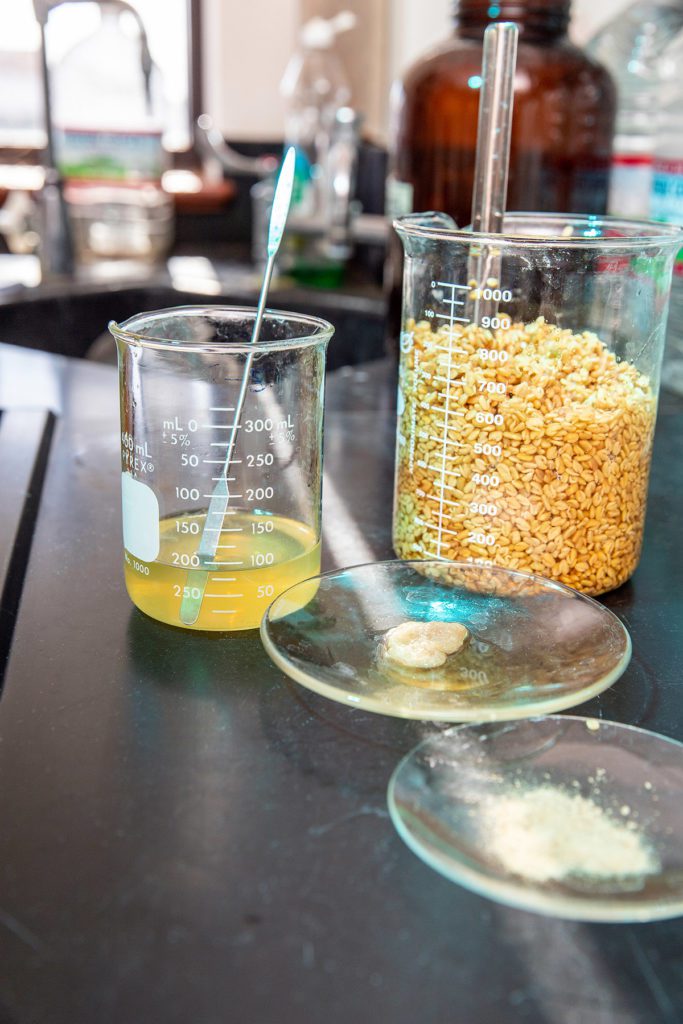
FOR IMMEDIATE RELEASE
March 22, 2022
STEPHENVILLE, Texas — Tarleton State University researchers led by Dr. Rajani Srinivasan have demonstrated that combinations of food-grade plant extracts, including those from okra, aloe, cactus and psyllium, have the power to remove microplastics from wastewater.
Findings were presented at the March 20-24 virtual spring meeting of the American Chemical Society.
The health effects of ingesting microplastics are unclear, but studies suggest that people unintentionally consume tens of thousands of particles every year.
“We think that microplastics by themselves may not be much of a health hazard, but anything they get into or any type of toxic substance that gets attached to them could go inside our bodies and cause problems,” said Associate Professor Srinivasan, the principal investigator for the project.
In the typical wastewater treatment process, microplastics are removed from water in two steps. Those that float are simply skimmed off. However, this step only removes a fraction of the total microplastics that are present. The rest must be removed by adding flocculants, or sticky chemicals that attract microplastics and form large clumps. The clumps then sink to the bottom of the water and can be separated from it.
Dr. Srinivasan, the Endowed Munson Research Professor of Chemistry, points out that some substances used to remove contaminants are potentially harmful, so she and her team have been investigating non-toxic alternatives. For example, one common flocculant, polyacrylamide, can break down into toxic chemicals under certain conditions.
“It doesn’t help if we try to clean up water but add potentially toxic substances to remove the pollutants,” she said.
She had studied the use of food-grade plant extracts as non-toxic flocculants to remove textile-based pollutants from wastewater. “I was working with the removal of microorganisms and things like that, and I thought, ‘Why not try microplastics?’”
So she and a team of undergraduate and environmental science master’s students tested polysaccharide extracts from fenugreek, cactus, aloe vera, okra, tamarind and psyllium as flocculants to capture microplastics. They tested compounds from the individual plants as well as in different combinations.
They found that polysaccharides from okra paired with those from fenugreek could best remove microplastics from ocean water, whereas polysaccharides from okra paired with those from tamarind worked best for freshwater samples. Overall, the plant-based polysaccharides worked better than, or as well as, the traditional flocculant polyacrylamide, depending on the combination of extracts and water source.
Importantly, the plant-based flocculants can be implemented in existing water treatment processes.
“The whole treatment method with the non-toxic materials uses the same infrastructure,” said Dr. Srinivasan. “We don’t have to build something new to incorporate these materials for water treatment purposes.”
She and her team will continue tailoring the ratios and combinations to optimize removal of different microplastic types from a variety of water sources. They also plan to scale up the removal process in field studies outside the lab. Ultimately, they hope to commercialize the method and remove microplastics from water on an industrial scale.
The project is supported through funding from the National Science Foundation and the High Plains Water Development District in Lubbock.
The American Chemical Society (ACS) is a nonprofit organization chartered by the U.S. Congress that promotes excellence in science education through multiple research solutions, peer-reviewed journals, scientific conferences, eBooks and the weekly Chemical & Engineering News.
ACS itself does not conduct chemical research, but it partners with global innovators to accelerate breakthroughs by curating, connecting and analyzing the world’s scientific knowledge.
A founding member of The Texas A&M System, Tarleton State University is breaking records — in enrollment, research, scholarship, athletics, philanthropy and engagement — while transforming the lives of more than 21,000 students in Stephenville, Fort Worth, Waco, Bryan and online. For over 125 years, Tarleton State has been committed to accessible higher education opportunities for all while helping students grow academically, socially and professionally through programs that emphasize real world learning and address regional, state and national needs.